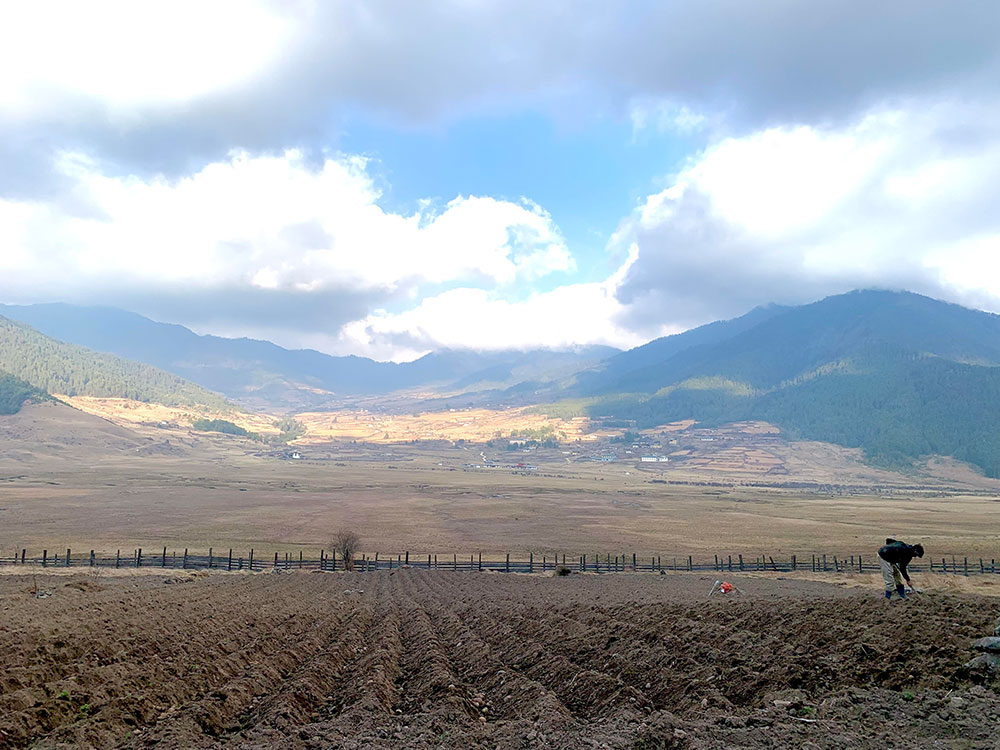Yangyel Lhaden
To safeguard the Gangtey-Phobjikha wetland and support the livelihoods of locals, particularly those reliant on potato farming, the Royal Society for the Protection of Nature (RSPN) is conducting assessments of soil, water, and vegetation in the valley through a project.
The two-year project, titled “Conservation of black-necked crane through wetland management, Bhutan”, in partnership with BirdLife Asia, commenced in January of this year.
This initiative aims to comprehend the extent of impacts from both natural phenomena and human activities on the wetland ecosystem. It seeks to generate quantitative data to present to the government and relevant stakeholders for interventions backed by evidence.
Presently, the threats to wetlands include drying, the growth of shrubs and woody plants which encroach upon the wetland, chemical fertilisers, weedicides, pesticides runoff from fields, and waste from increasing tourism, among others.
Locals reminisce about a time when the wetland retained its moisture even during the winter months, necessitating the use of Wellington boots for traversal. However, nowadays, it dries up entirely during winter, and its moisture levels in the summer have noticeably decreased compared to the past.
“It is important to conserve wetlands, as they have a higher carbon sequestration level compared to forests, and a healthy wetland benefits the people in the valley both directly and indirectly,” National Coordinator for Crane Conservation at RSPN, Jigme Tshering said. “Qualitative views on the wetland needs to be backed up by scientific data for informed decision-making.”
The Gangtey-Phobjikha wetland expands over 974.65 hectares and is home to about 100 species of bird, mostly migratory and about 10 species of wild mammals.
The people of this valley’s sole cash crop is potato and their potato cultivation is depended on usage of chemical fertilisers annually. The locals apply chemical fertilisers based on affordability and they use as much organic manure as well.
While the precise quantity of chemical fertilisers applied in the two gewogs remains uncertain, recent soil quality assessments conducted through this project by the National Soil Services Centre indicate favourable soil and water conditions.
However, the results reveal an anomaly: the soil in Gangtey is found to have phosphorus levels surpassing the acceptable range.
“There is threat to the wetland from excessive use of fertilisers and run-off of extra fertilisers in the wetland,” Jigme Tshering said. “ Through this project we want to conserve the wetland and in the heart of conservation is protecting livelihood of people.”
“By the end of the project, the primary aim is to safeguard the livelihoods of farmers as we intend to achieve this by advocating for organic farming models such as IBIS rice,” Jigme Tshering said.
“This approach ensures that farmers can sustain their livelihoods without facing concerns regarding yield and the value of their produce. This is vital in promoting the adoption of organic farming,” he said.
The giant ibis is a critically endangered bird and is Cambodia’s national bird which was believed to be extinct for almost 50 years due to habitat loss, deforestation, and illegal hunting, until a camera trap captured a photo of one during a survey. IBIS rice—the real taste of conservation—is a product produced organically in Cambodia, founded by the Wildlife Conservation Society to save the critically endangered ibis.
“We could promote Gangtey-Phobjikha potatoes as “Thrung Thrung Potatoes” or “Crane Potatoes,” which are organically grown products resulting from conservation efforts,” Jigme Tshering said. “This will require immense support to our farmers to transition from chemical fertilisers to fully organic methods by adding value to their potatoes through branding and finding sustainable markets with the help of entrepreneurs and government support.”
Presently, the farmers in these valleys face insufficient organic fertilisers and are unable to apply them, relying more on chemical fertilisers which often strain their finances.
“In the beginning, the government also needs to develop a mechanism to provide enough organic fertilisers at a subsidised cost,” Jigme Tshering said. “Through this project, we will also conduct advocacy and awareness programmes within the community, hold consultation meetings with stakeholders, and analyse their land use and changes in land-use cover for enhanced wetland management.”


